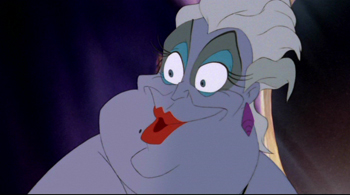

"The men up there don't like a lot of blabber / They think a girl who gossips is a bore / Yes, on land it's much preferred / for ladies not to say a word / After all, dear, what is idle prattle for? / Come on, they're not all that impressed with conversation / True gentlemen avoid it when they can / But they dote and swoon and fawn / On a lady who's withdrawn / It's she who holds her tongue who gets her man" (Ursula in The Little Mermaid).
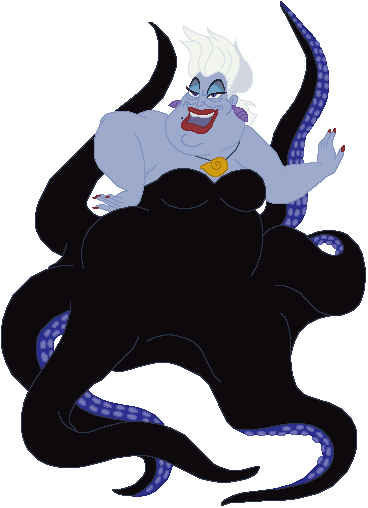
|
During the conversation concerning what Ursula can do for Ariel's desire to be human, Ursula sings Poor Unfortunate Souls, a song that explains how she has helped a number of poor souls "to be thinner" and "to get the girl." It may be substantial to note that this song, and others in the movie, were written by a male, who may have very well written them from a male's standpoint. Ursula, from the feminist perspective represents a character that exposes the realities behind society's expectations of women and as well as a more truthful relationship between men and women. She serves as an ideology critique but her character is that of a greedy, insensitive and evil witch that tricks Ariel. For this reason, despite her aggressiveness and control, her wickedness and cruelty overpower any sort of respect she could ever acquire. Ariel tells her, "If I become human, I'll never be with my father or sisters again," and Ursula replies, "But you'll have your man. Life's full of tough choice, isn't it?" Ursula explains to Ariel that when it comes down to sacrificing one thing to gain another, it is worth giving up if it guarantees "you'll have your man." "Of course, within Disney's patriarchal ideology, any woman with power has to be represented as a castrating bitch" (Sells 181). Ursula's image also draws a parallel with the evil females in other Disney movies, becoming a metonymic sign since the evil females usually share the same physical features as well. In the same way their behavior is unlike that of the heroines', their physical features are also nothing like the princesses'. Ursula is big, hideous and even has some masculine features. Over and over again the females with strength are inherently evil, and those with beauty triumph over. As metonymic signs, unattractive female characters are directly associated with wickedness and related traits, always representing what the heroine does not. |
| Ursula, the only female with a voice and with power, is killed in the end, while the subjective female, Ariel, lives happily ever after in view of the fact that the voice of a woman matters little in the movie. Through her beauty and "body language" Ariel is able to win Prince Eric's affection instantaneously. Because the battle between good and evil is a central focus in most fairy tales and Disney movies, it is important to analyze what Ursula's character has to offer. For Ariel, Ursula is the female that encompasses evil, but ironically, teaches her a thing or two about human sexuality in order to conquer Prince Eric's love. During her performance of Poor Unfortunate Souls Ursula does not only tell Ariel that she is doing the right thing by giving up her voice in exchange for legs, she acts out what it is to be a female and shows Ariel how to get her man. |

|
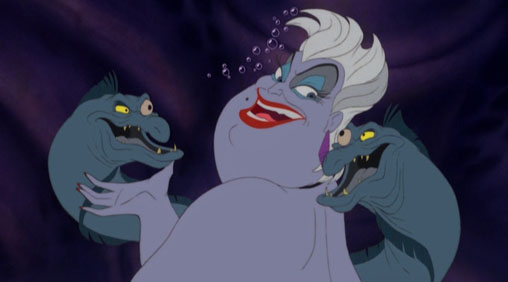
|
| As Ursula sings she puts on lipstick and styles her hair, and then goes on to use her eel as a boa swung around her neck while she dances seductively. Her performance establishes that femininity is not something a female possesses naturally but must act out, and through it, Ursula gives Ariel the tools to lure Prince Eric. "Ariel learns that gender is performance; Ursula doesn't simply symbolize woman, she performs woman. Ursula uses a camp drag queen performance to teach Ariel to use makeup, to 'never underestimate the importance of body language,' to use the artifices and trappings of gendered behavior" (Sells 183). This act is what the male gaze survives on, positioning the woman as a beautiful being that is fragile and allows herself to be manipulated. Since a female's actions are viewed as a performance, "femininity can be seen as a mask, a masquerade, performed by mimicking what being a woman is meant to be about" (Rose 123). Gender is portrayed as something that can be used as a mask. It can be put on and then taken off when necessary. Although this masquerade might empower Ariel, it impedes her as well since she must abide by these cultural rules to satisfy a man and be accepted on land. As a result, Ariel's abilities as a talented singer are replaced with her sexual abilities. |
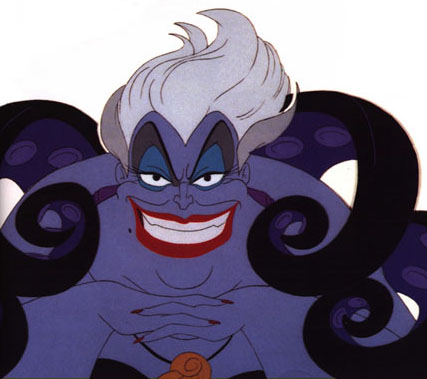
|
Ursula exposes myths of beauty and sexualized gender roles that commend a patriarchal society. Regardless, she is the symbol of evil in the movie and by Disney nature cannot succeed in the end. Rose uses the term "phallocentrism" to describe "the way cultural meaning is structured around masculine terms" (115). The Little Mermaid plays out the difference between males and females by utilizing the phallus as an object Ursula wishes to obtain. Throughout the movie, Ursula's driving force is her desire to rule the sea and obtain King Triton's scepter, a representation of the phallus. This sexual difference is also expressed through Ursula's image as a female with masculine features that almost instantly indicate she experiences "penis envy" since she is a female but in some ways resembles a male. In the ending scenes of the movie, Ursula gets a hold of the scepter but is soon killed by the mast of a ship Prince Eric maneuvers. "Not only do children find out what happens to the various princes and princesses [and] witches, but they also learn behavioral and associational patterns, value systems, and how to predict the consequences of specific circumstances. Among other things, these tales present a picture of sexual roles, behavior, and psychology, and a way of predicting outcome or fate according to sex, which is important because of the intense interest that children take in 'endings'; they always want to know how things will 'turn out'" (Lieberman 384). |
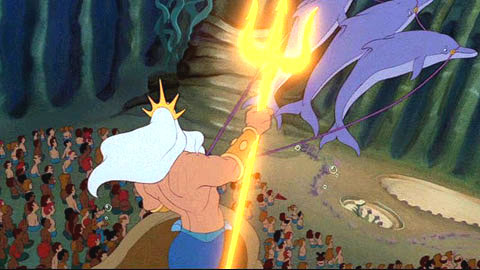
|
| Ursula's attempts to be ruler of the sea are prevented and the male preserves his dominion. Her assertiveness is punished by death while Ariel's passivity is rewarded with a handsome prince. Therefore, The Little Mermaid leaves a clear implication by instituting these sexual differences. Disney's females are undoubtedly better off tolerating a patriarchal society than rebelling against it with efforts to fulfill a position in the male dominated world where females like Ursula are eradicated. "Ursula is the female symbolic encoded in patriarchal language as grotesque and monstrous; she represents the monstrosity of feminine power" (Sells 184). |